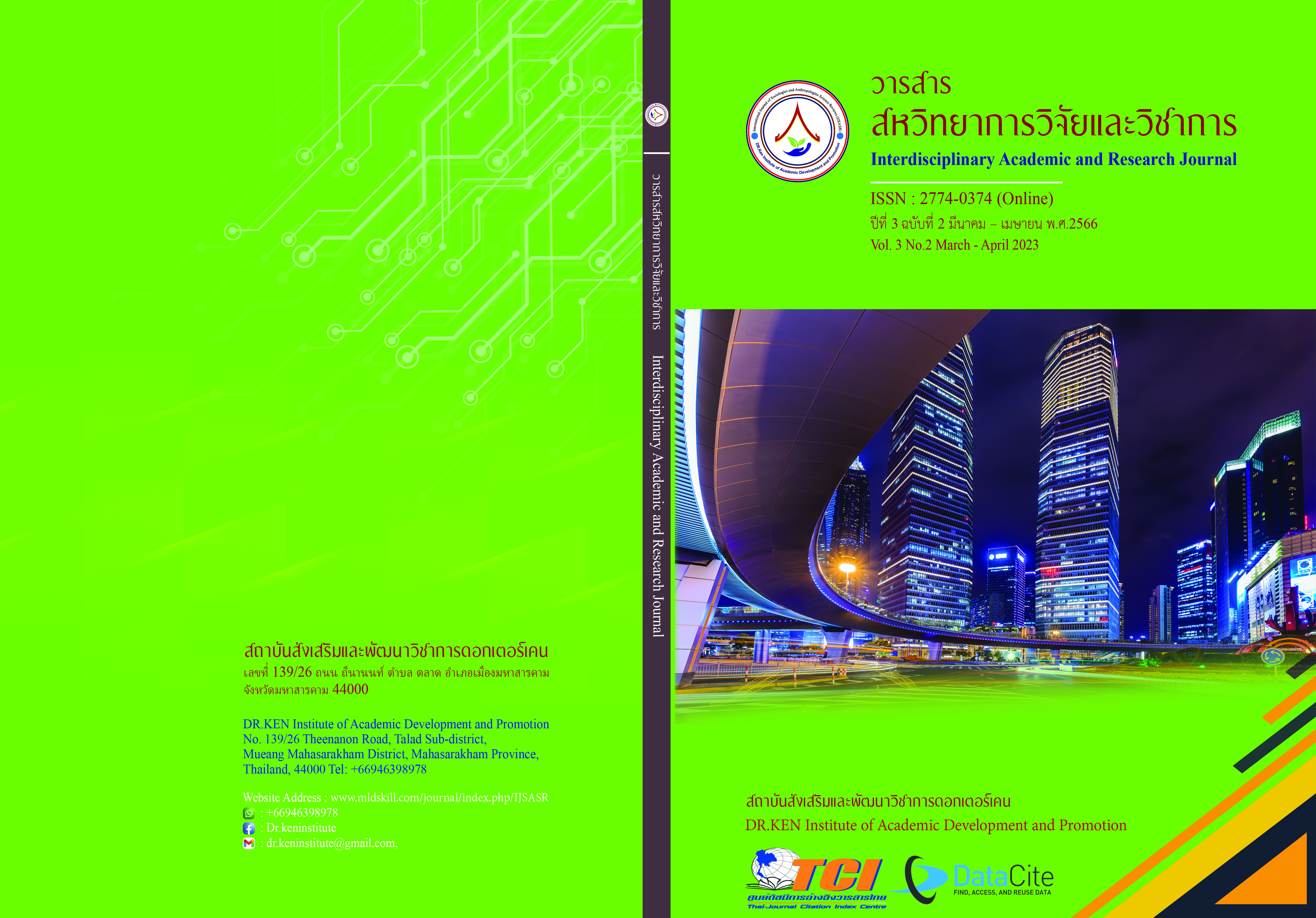Application of Sufficiency Economy Philosophy in Management of Schools under the Nakhon Ratchasima Primary Educational Service Area Office, Region 1
DOI:
https://doi.org/10.14456/iarj.2023.74Keywords:
Sufficiency Economy Philosophy; , Management; , Nakhon Ratchasima Primary Educational Service Area Office Region 1Abstract
The sufficiency economy philosophy is part of the curriculum for children to learn how to live a balanced life according to the philosophy of the economy. Values, cultures, values of being Thai in the midst of changes, knowing that oneself is an element in the world's environment and culture, their actions are linked to the world's environment. This research aims to (1) study the application of the sufficiency economy philosophy in school management under the Nakhon Ratchasima Primary Educational Service Area Office 1. And (2) to compare the level of opinions of personnel towards the application of the sufficiency economy philosophy in school management under the Office of Nakhon Ratchasima Primary Educational Service Area 1 classified by sex, education level, and work experience. The population in this research consisted of 1,954 personnel in educational institutions under the Nakhon Ratchasima Primary Educational Service Area Office 1, using a sample of 333 people. The research tool was a questionnaire on personnel’s opinions towards applying the sufficiency economy philosophy in management. the statistics used in the research were frequency, mean, percentage, standard deviation, F-test, and t-test. The results showed that; (1) The application the of sufficiency economy philosophy in school management under the Office of Nakhon Ratchasima Primary Educational Service Area Office 1 was at a high level overall. And (2) a comparative analysis of opinions on the application of the sufficiency economy philosophy in the management of schools under the Nakhon Ratchasima Primary Educational Service Area Office found that: (a) classified by sex, the overall difference was statistically significant at the .05 level, and the individual aspects were not different. (b) Classified by the level of education in general and in each aspect is not different. And (c) classified according to work experience in general and in each aspect is not different.
References
กระทรวงศึกษาธิการ. (2552). เอกสารแนวทางการนิเทศเศรษฐกิจพอเพียงสู่สถานศึกษา. กรุงเทพฯ: ศูนย์ประสานงานกลางการดำเนินงานโครงการอันเนื่องมาจากพระราชดำริ, สำนักกิจการพิเศษ สำนักงานปลัดกระทรวงศึกษาธิการ.
กาญจนา วิเชียรศรี กฤตยากร ลดาวัลย์ และวิมลพร สุวรรณแสนทวี. (2562). การบริหารจัดการศึกษาตามหลักปรัชญาของเศรษฐกิจพอเพียงในสถานศึกษา สังกัดสำนักงานส่งเสริมการศึกษานอกระบบและการศึกษาตามอัธยาศัยจังหวัดร้อยเอ็ด. วารสารพุทธปรัชญาวิวัฒน์. 4(2), 21-32.
บุญชม ศรีสะอาด. (2553). หลักการวิจัยเบื้องต้น. กรุงเทพฯ : สุวีริยาสาสน์การพิมพ์.
ประธาน ขรรค์เจนการ และไตรรัตน์ สิทธิทูล. (2563). การบริหารกิจกรรมพัฒนาผู้เรียนตามหลักปรัชญาของเศรษฐกิจพอเพียง ของโรงเรียนในสังกัดสำนักงานเขตพื้นที่การศึกษาประถมศึกษาสมุทรปราการ เขต 1. วารสารราชพฤกษ์. 18(3), 68-78.
พินิจ เครือเหลา. (2561). การบริหารสถานศึกษาตามหลักปรัชญาของเศรษฐกิจพอเพียง โรงเรียนพิทยาลงกรณ์พิทยาคม. ศึกษาศาสตรมหาบัณฑิต สาขาวิชาการบริหารการศึกษา, มหาวิทยาลัยศิลปากร.
รุ้งเพ็ชร หัตถามาศ,สมชาย วงศ์เกษม,จำเนียร พลหาญ. (2563). รูปแบบการพัฒนากิจกรรมพัฒนาผู้เรียนที่มีประสิทธิผลตามหลักปรัชญาของเศรษฐกิจพอเพียง โรงเรียนขนาดเล็ก สังกัดสำนักงานเขตพื้นที่การศึกษาประถมศึกษากาฬสินธุ์. วารสารครุศาสตร์ มหาวิทยาลัยราชภัฏมหาสารคาม. 17(1), 235-246.
สมคิด บางโม. (2558). องค์การและการจัดการ. กรุงเทพ: บริษัท วิทยพัฒน์ จํากัด.
สำนักงานเขตพื้นที่การศึกษาประถมศึกษานครราชสีมา เขต 1. (2565). รายงานการปฏิบัติงาน. นครราชสีมา.
Krejcie, R. V. & Morgan, D. W. (1970). Determining Sample Size for Research Activities. Educational and Psychological Measurement, 30(3), 607-610.
Downloads
Published
How to Cite
Issue
Section
License
Copyright (c) 2023 สาธิต เพ็ชรรามพะเนา

This work is licensed under a Creative Commons Attribution-NonCommercial-NoDerivatives 4.0 International License.
Copyright on any article in the Interdisciplinary Academic and Research Journal is retained by the author(s) under the under the Creative Commons Attribution-NonCommercial-NoDerivatives 4.0 International License. Permission to use text, content, images, etc. of publication. Any user to read, download, copy, distribute, print, search, or link to the full texts of articles, crawl them for indexing, pass them as data to software, or use them for any other lawful purpose. But do not use it for commercial use or with the intent to benefit any business.
















.png)


